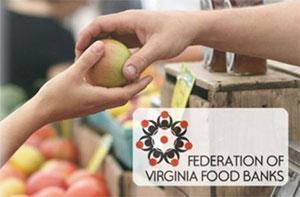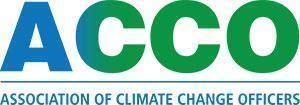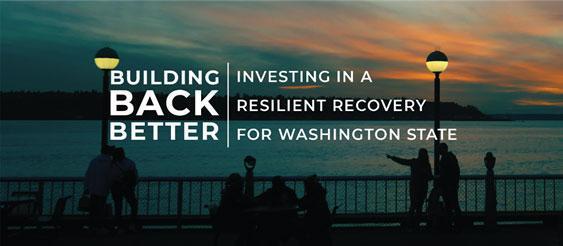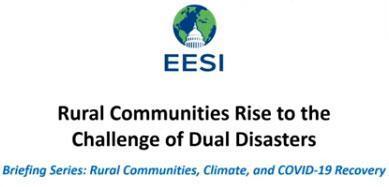In This Issue:
Help Us Help Others
We are working to help others in this difficult time, so we are sending this Communication Brief to members and friends of Resilient Virginia.
The Federation of Virginia Food Banks reports that demand for their services has increased over 40% in their seven food banks across Virginia as economic conditions further stress families in need. In addition, food distribution channels are in flux and food bank employees are working hard to safely deliver food while protecting their clients, volunteers and staff.
 That’s why, for the month of July, Resilient Virginia is donating 50% of all memberships, annual sponsorships, and cash donations we receive to the Federation of Virginia Food Banks.
That’s why, for the month of July, Resilient Virginia is donating 50% of all memberships, annual sponsorships, and cash donations we receive to the Federation of Virginia Food Banks.
Help us help others while we also continue our mission of:
- informing community members and governments on climate, COVID, equity, and resilient recovery;
- educating by developing workshops and conferences on priority resiliency topics; and
- activating communities by supplying the tools they need to move toward a more resilient future.
Online Learning Opportunities
Check out Resilient Virginia’s web calendar for more events.
Climate Superheros Webcast Series
A virtual “talk show” style program featuring special guest superheroes. Bold, innovative and uplifting ideas inspiring the climate change community of practice to embrace their inner hero! Login and join the discussion by selecting the program below.
Webcast #16: Mary Nichols (California Air Resources Board)
Tuesday, July 7, 2020
12:00–1:00 p.m. EST
UVA Clubs Presents On-Air with Karen McGlathery: “Natural Solutions to Climate Change”
The UVA Clubs program and the Environmental Resilience Institute invite you to join Karen McGlathery for a private conference call to discuss “Natural Solutions to Climate Change.” Karen McGlathery, Professor of Environmental Sciences, Director of UVA’s Environmental Resilience Institute, and Director of the Virginia Coast Reserve Long Term Ecological Research program, will share her thoughts and will then answer live questions from the audience.
Thursday, July 9, 2020
3:00–4:00 p.m. EST
Clean Energy Virginia Five-Part Webinar Series
You are invited to participate in the Clean Energy Virginia Five-Part Webinar Series hosted by Governor Northam’s Office and the Virginia Department of Mines, Minerals and Energy (DMME). The focus of the webinar series is on recent legislation that creates advantages for clean energy businesses to expand or locate in Virginia. Please join us for these highly educational sessions. For more information, please contact: Jordan Burns, jordan.burns@dmme.virginia.gov, (804) 786-7900.
Webinar 1: Energy Efficiency
Wednesday, July 22, 2020
1:00–2:30 p.m. EST
Click here to register.
Event password: dmme1
Webinar 2: Distributed Generation Solar
Wednesday, July 29, 2020
1:00–2:30 p.m. EST
Click here to register.
Event password: dmme1
Webinar 3: Energy Storage
Wednesday, August 5, 2020
1:00–2:30 p.m. EST
Click here to register.
Event password: dmme1
Webinar 4: Utility Scale Solar, Onshore Wind and the Virginia Clean Energy Act
Wednesday, August 12, 2020
1:00–2:30 p.m. EST
Click here to register.
Event password: dmme1
Webinar 5: The Virginia Advantage in Offshore Wind
Wednesday, August 19, 2020
1:00–2:30 p.m. EST
Click here to register.
Event password: dmme1
Announcing Resilient Virginia’s New Website
Last week, we announced our new website design that brings viewers:
- A resiliency definition
- Our mission, vision, and values
- Why your community needs a resiliency plan
- Components of a resilient community
- Examples of resiliency planning in the state
- Highlights of Resilient Virginia’s accomplishments
We need YOUR input: Please take a look at our new website and provide your feedback through this short survey.
Special Bonus: The first 6 survey respondents will receive a $5 gift certificate from

Located on Route 29, Moo Thru’s ice cream is handcrafted and slow-churned in Remington, Virginia. Each ingredient is hand-selected, fresh, and local whenever possible.
What We Are Reading
We’re presented with arguably the greatest crisis of our lifetimes — a global health crisis coupled with the ensuing economic stagnation and massive unemployment that have left our communities suffering and struggling to get by. It has also brought to light the deep racial and social inequalities we have been living with, and the pressing need to pursue justice.
Collectively we must ask: Do we revert to status quo recovery models that prioritize corporate bailouts and fiscal austerity, or do we leverage this moment to pursue a vision that addresses these complex issues and makes our communities more resilient?
The Climate Exchange is proud to share their newest research, done together with the Low Carbon Prosperity Institute, on what a resilient recovery may look like for Washington State. The report, “Building Back Better Washington: Investing in Jobs and Community Health for a Resilient Recovery,” finds that an effective path to economic recovery prioritizes investments in a Resilient Recovery Portfolio of programs, which collectively offer a positive return on investment in community health through clean air benefits and avoided climate damages
What We Are Watching
Rural communities face unique challenges in preparing for flooding and addressing related infrastructure needs. Local governments with small staffs often do not have the capacity to apply for disaster preparedness funding and can be left out of valuable federal programs. This briefing characterized these issues in the context of COVID-19 and highlighted solutions communities are implementing to meet them.
Dr. Richard Norton, Professor of Urban and Regional Planning at the University of Michigan (UM), discussed his work with Great Lakes coastal communities, which are mostly small and rural communities, and he used the example of the recent Midland dam floods to highlight governance challenges in repairing critical infrastructure.
Steve Samuelson, CFM, National Flood Insurance Program Coordinator for the State of Kansas Department of Agriculture, discussed the issues small towns face when attempting to access federal mapping and flood protection programs, and the programs that are working to build flood resilience in these rural areas.
Continue your support throughout the year by using one or both of these online shopping sites that contribute to Resilient Virginia:

If Amazon is your online shopping choice, go to Smile.Amazon.com and designate Resilient Virginia and we will receive a donation with every purchase.

Find lots of discounts and many participating stores for office supplies, general shopping, and special event gifts.
Thanks for supporting Resilient Virginia and helping us expand our resiliency information hub, carry out workshops and conferences, and offer communities the tools they need to address climate change.
The Resilient Virginia Communication Brief is a new service in 2020 for members and supporters. We will be sending you special communications about our events, as well as about other learning opportunities that are happening around the state and helpful links to resiliency resources.











